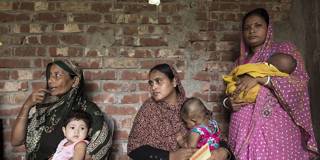A new, low-cost vaccine that protects against pneumonia enabled Bangladesh to halve the number of severe cases in five years. Now that the World Health Organization has approved the vaccine, it should be rolled out wherever it is needed.
DHAKA – Last year, a child died of pneumonia every 39 seconds, on average. A form of acute respiratory infection, pneumonia is detectable, treatable, and preventable. Pneumococcal conjugate vaccines (PCVs) – which protect against the bacteria that cause pneumonia and meningitis (a life-threatening brain infection) – have existed since 2000. But their use has been concentrated largely in developed countries, for a simple reason: they are very expensive. Fortunately, a new vaccine could change that.
As it stands, pneumonia disproportionately affects the most vulnerable: children and the elderly, especially those living in developing countries. In 2019, 70 million children were not fully protected by PCVs. More than 80% of them lived in Southeast Asia, the Western Pacific, and Africa. This figure may be even higher in 2020, because many of the countries with large populations of unvaccinated children have reported major disruptions to their immunization programs as a result of COVID-19.
Before the pandemic, children in low-income countries were nearly 14 times more likely than children in high-income countries to die before the age of five, owing largely to pneumonia and other acute infections. That rate may be set to rise: new data show that the pandemic-related disruptions to health-care systems and decreased access to food could cause an additional one million child deaths in low- and middle-income countries.

DHAKA – Last year, a child died of pneumonia every 39 seconds, on average. A form of acute respiratory infection, pneumonia is detectable, treatable, and preventable. Pneumococcal conjugate vaccines (PCVs) – which protect against the bacteria that cause pneumonia and meningitis (a life-threatening brain infection) – have existed since 2000. But their use has been concentrated largely in developed countries, for a simple reason: they are very expensive. Fortunately, a new vaccine could change that.
As it stands, pneumonia disproportionately affects the most vulnerable: children and the elderly, especially those living in developing countries. In 2019, 70 million children were not fully protected by PCVs. More than 80% of them lived in Southeast Asia, the Western Pacific, and Africa. This figure may be even higher in 2020, because many of the countries with large populations of unvaccinated children have reported major disruptions to their immunization programs as a result of COVID-19.
Before the pandemic, children in low-income countries were nearly 14 times more likely than children in high-income countries to die before the age of five, owing largely to pneumonia and other acute infections. That rate may be set to rise: new data show that the pandemic-related disruptions to health-care systems and decreased access to food could cause an additional one million child deaths in low- and middle-income countries.